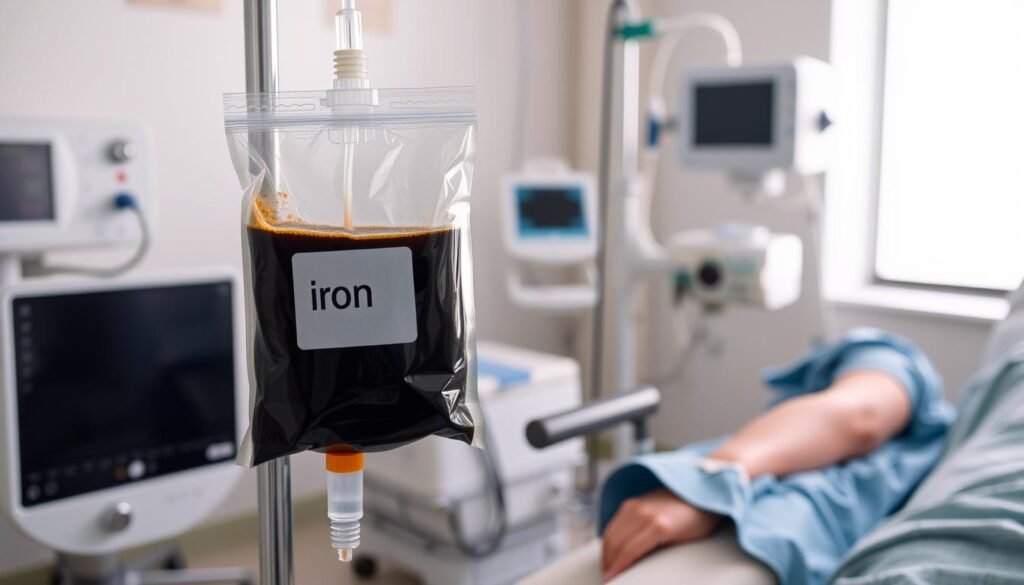Iron Infusion During Pregnancy : Keeping iron levels right during pregnancy is key for both mom and baby. Iron deficiency is common and can cause big problems if not fixed. Iron helps with fetal growth and keeps mom’s energy up. We’ll look into iron infusion during pregnancy, its good points, possible downsides, and tips for moms-to-be. Knowing about this treatment can help keep pregnancy safe for both mom and baby.
Key Takeaways
- Iron infusion is vital in treating iron deficiency during pregnancy.
- Maintaining adequate iron levels supports fetal development and maternal energy.
- Complications from iron deficiency can impact both mother and baby.
- Understanding the procedure and its benefits can enhance pregnancy health.
- Consulting healthcare professionals is crucial for tailored care.
- Monitoring for risks and side effects post-infusion is important.
Understanding Iron Deficiency in Pregnancy
Iron deficiency in pregnancy affects both the mother and the baby. Pregnant women need more iron for their blood and the baby’s growth. It’s key to know the signs of iron deficiency to get the right care.
Signs and Symptoms of Iron Deficiency
Common signs of iron deficiency in pregnancy include:
- Fatigue and exhaustion
- Pale skin
- Weakness
- Dizziness or lightheadedness
- Shortness of breath
These symptoms of iron deficiency show you might not have enough iron. You should see a doctor if you notice them.
How Iron Deficiency Affects Mother and Baby
Iron deficiency has serious effects on both the mother and the baby. For the mother, it can cause problems during delivery, like more bleeding after birth. For the baby, it might mean being born too small, having delays in development, and even problems with thinking and learning.
Getting treatment for iron deficiency early can help avoid these problems. It’s important for the health of both the mother and the baby.
What is Iron Infusion?
Iron infusion is a medical procedure that puts iron directly into your blood through an IV line. It helps with iron deficiency anemia, especially during pregnancy. This method is more effective than taking iron pills because it goes straight into your blood.
A healthcare professional will put an IV line into your vein for this procedure. They will then give you iron solutions through it. This is done in a clinic where you can be closely watched. Iron infusion works faster than iron pills, showing results sooner.
Iron infusion is great for people who can’t take iron pills because of side effects. It also helps those who don’t absorb iron well from food. It boosts your iron levels, helping you stay healthy during pregnancy.
Reasons for Iron Infusion During Pregnancy
Pregnancy increases the need for nutrients, especially iron. Sometimes, taking iron pills isn’t enough. That’s when doctors might suggest iron infusion. Knowing why iron infusion is needed during pregnancy helps expectant mothers take care of their health.
When Oral Supplements are Insufficient
Iron infusion is better than oral supplements in some cases. Here’s why:
- Severe Anemia: If blood tests show very low hemoglobin, infusions help quickly add iron.
- Gastrointestinal Absorption Issues: Problems like celiac disease or inflammatory bowel disease can block nutrient absorption. Oral supplements won’t work well.
- Intolerance to Oral Supplements: Some women can’t take iron pills because of stomach problems or other side effects. Infusions are a better option.
Oral supplements can’t meet the needs of both mom and baby in these situations. That’s why iron infusion is so important.
Iron Infusion Pregnancy: Benefits and Advantages
Pregnancy comes with its own set of challenges. One key issue is iron deficiency, which affects both mom and baby. Iron infusion during pregnancy offers many benefits that can greatly improve health.
Improved Iron Levels
Iron infusion quickly boosts iron levels. This is crucial for carrying oxygen in the blood. It helps both mom and the growing baby. With normal iron levels, pregnancy complications linked to anemia decrease, making the experience healthier.
Enhanced Energy Levels
Iron infusion also boosts energy. Iron is key in preventing pregnancy fatigue. Moms who get this treatment often feel more energetic and alive, enhancing their pregnancy experience.
| Benefits | Description |
|---|---|
| Improved Iron Levels | Restores iron quickly, enhancing oxygen transport in the blood. |
| Increased Energy | Alleviates fatigue, leading to greater overall vitality during pregnancy. |
| Overall Health | Reduces the risk of complications linked to iron deficiency anemia. |
Risks and Side Effects of Iron Infusion
Iron infusion is a common treatment for iron deficiency in pregnancy. It’s important to know the risks of iron infusion pregnancy and side effects of iron infusion. This knowledge helps both patients and doctors make better choices.
Common Side Effects
Many people feel mild side effects after an iron infusion. These can include:
- Skin irritation at the infusion site
- Headaches
- Nausea
- Fatigue
These side effects of iron infusion are usually short-lived but can be uncomfortable.
Serious Risks to Consider
There are rare but serious risks to watch out for. These include:
- Allergic reactions, which might manifest as rash, itching, or difficulty breathing
- Heart failure in patients with pre-existing heart conditions
- Pulmonary complications, such as fluid overload
Knowing the risks of iron infusion pregnancy helps patients spot symptoms early. They can then get medical help quickly if needed.
| Risk/Side Effect | Description |
|---|---|
| Skin Irritation | Redness or swelling at the infusion site |
| Headaches | Common discomfort that may last for a short duration |
| Nausea | Feeling queasy, often resolving quickly |
| Allergic Reactions | Severe responses requiring immediate attention |
| Heart Failure | Risk for those with existing heart issues |
| Pulmonary Complications | Possible fluid overload leading to respiratory distress |
How is Iron Infusion Administered?
The iron infusion process has several steps to ensure it’s safe and effective. Knowing how it’s done helps you understand what to expect during treatment.
Infusion Process Overview
It starts with a detailed consultation to check the individual’s needs. After approval, the patient is set up for the infusion. A healthcare professional inserts an IV line to deliver iron directly into the blood.
They watch closely for any reactions or side effects during the infusion. The treatment usually happens in a clinical setting. This way, help is always nearby if needed.
Typical Duration and Frequency of Infusions
The time it takes for the infusion can vary. It might last from 30 minutes to several hours, depending on the iron type. Some people might need more than one session to get enough iron.
The number of infusions needed depends on the person’s health and how they react to the treatment. Regular check-ups are important. They help make sure iron levels are right and make any needed changes.

Preparing for an Iron Infusion
Getting ready for an iron infusion is key. A detailed consultation before infusion with your doctor is vital. It helps figure out what you need and if there are any risks. This talk is crucial for knowing what to expect and getting advice that fits you.
Consultation with Your Healthcare Provider
Talk about your health history, medicines, and allergies during your meeting. Your doctor will check your iron levels and might do blood tests. This is to see if you really need an infusion. Share any worries you have to feel more at ease.
Pre-Infusion Preparations
Before the infusion, there are steps to take for a better experience:
- Follow any fasting rules your doctor gives you.
- Don’t take iron supplements the day before to avoid problems.
- Change your medicines as your doctor suggests, especially if they could affect the infusion.
- Drink plenty of water to make your veins easier to find.
Being ready will make your iron infusion experience better. It will help you feel healthier in the end.
| Pre-Infusion Task | Description |
|---|---|
| Consultation | Discuss health history and infusion necessity. |
| Fasting | Follow recommended fasting protocols. |
| Medication Review | Adjust medications as directed by your provider. |
| Hydration | Ensure proper hydration before the procedure. |
Aftercare Following Iron Infusion
After an iron infusion, taking care of yourself is key. Monitoring your health closely is important. It helps you recover faster and catches any issues early.
Post-Infusion Monitoring
Monitoring your health after the infusion is crucial. Keep an eye on your vital signs and overall health. This ensures you’re on the right track.
- Vital Signs: Check your temperature, heart rate, and blood pressure often.
- Hydration: Drink lots of water to help your body process the iron.
- Rest: Rest well to help your body heal.
Signs of Complications to Watch For
Even though complications are rare, it’s important to be alert. Look out for these signs that might mean you need to see a doctor right away:
- Chest Pain: If you have severe chest pain, get help fast.
- Difficulty Breathing: If you’re having trouble breathing or wheezing, talk to a doctor.
- Allergic Reactions: Watch for rashes, itching, or swelling, and see a doctor if they happen.
| Monitoring Aspect | Action |
|---|---|
| Vital Signs | Check regularly for stability |
| Hydration | Increase fluid intake |
| Rest | Prioritize sleep and recovery |
| Signs of Complications | Be alert for chest pain or difficulty breathing |
Alternative Iron Supplements and Treatments
Iron deficiency is common during pregnancy and needs good management. There are many ways to tackle this, like iron infusions, oral supplements, and changing your diet. Knowing the differences between iron infusions and oral supplements helps pregnant women choose the best iron option for them.
Comparison of Infusions vs Oral Supplements
Looking at iron infusions and oral supplements shows their unique benefits and downsides:
| Aspect | Iron Infusion | Oral Supplements |
|---|---|---|
| Absorption Rate | High absorption; immediate effect | Lower absorption; may take weeks to see changes |
| Side Effects | Possible allergic reactions; risk of infections | Gastrointestinal discomfort; constipation |
| Frequency of Administration | Administered in a clinical setting, less frequent | Daily dosage required |
| Convenience | Less convenient; medical supervision required | More convenient; can be taken at home |
Dietary Sources of Iron
Adding iron-rich foods to your diet also helps keep iron levels up during pregnancy. Here are some top foods for iron:
- Red meat – Great source of heme iron, easy to absorb
- Poultry and fish – Good for heme iron
- Beans and lentils – Full of non-heme iron, perfect for vegetarians
- Leafy greens – Like spinach, offer non-heme iron
- Fortified cereals – Many are iron-enriched, helping meet daily needs
Who Should Consider Iron Infusion?
Iron infusion is key for pregnant women at risk of severe iron deficiency. It’s vital to know who needs it for proper care. Many at-risk groups can greatly benefit from this treatment.
At-Risk Groups
It’s important to know who is at risk of iron deficiency. Some groups may need iron infusion because they’re more likely to get anemia:
- Women with a history of anemia or low iron levels during previous pregnancies
- Expectant mothers carrying multiples, as they have higher iron demands
- Individuals with dietary restrictions, such as vegans or vegetarians
- Those suffering from chronic conditions that affect absorption, like gastrointestinal disorders
- Women experiencing heavy menstrual bleeding prior to pregnancy
Recommendations from Health Professionals
Health experts suggest getting a personalized check-up to see if you need iron infusion. Early screening for iron deficiency is especially important for at-risk groups. If you’re showing signs of anemia or low iron, talk to your doctor about treatment.
Regular blood tests help doctors keep an eye on your iron levels. They can recommend iron infusion if needed.
Iron Infusion Cost and Insurance Coverage
It’s important for pregnant women to know about the costs of iron infusion treatments. The cost of iron infusion pregnancy can change a lot. It depends on where you are, the place you go to, and who gives you the treatment. Costs can be anywhere from a few hundred to several thousand dollars for each session.
How much you pay out of pocket depends on your insurance. Many plans help cover some of the costs. But, what’s covered can vary a lot. It’s key to check your insurance and talk to your doctor about what you might have to pay.
When you’re getting ready for an iron infusion, think about a few things:
- Where the procedure is done can affect the price.
- Whether it’s at a hospital or a clinic can also change the cost.
- What your insurance says about covering the infusion and any deductibles.
To give you a better idea of what iron infusion costs might be, here’s a table. It shows general price ranges and what insurance might cover:
| Procedure Type | Estimated Cost | Typical Insurance Coverage |
|---|---|---|
| Outpatient Iron Infusion | $300 – $600 per session | 60% – 80% covered |
| Hospital-Based Iron Infusion | $1,000 – $3,000 per session | 50% – 70% covered |
| Consultation Fees | $100 – $300 | Varies by plan |
Personal Experiences and Testimonials
Many expectant mothers have shared their iron infusion experiences during pregnancy. Their stories show both successes and challenges. These personal accounts offer valuable insights into the treatment’s effects.
Positive Outcomes from Iron Infusion
Iron Infusion During Pregnancy : Testimonials highlight the benefits of iron infusion. Women often report more energy and better health after the treatment. Some notable positive outcomes include:
- Increased stamina for daily activities.
- Better management of pregnancy-related fatigue.
- Improved iron levels leading to healthier prenatal development.
Challenges Faced by Some Expectant Mothers
Not all experiences with iron infusion are positive. Some women face challenges. Common issues include:
- Minor side effects such as nausea or a metallic taste in the mouth.
- The need for multiple sessions, which may cause emotional stress.
- Concerns about the long-term effects on the baby and their health.
These varied experiences help others understand the treatment better. They offer comfort to those thinking about iron infusion during pregnancy.

Research and Studies on Iron Infusion During Pregnancy
Iron Infusion During Pregnancy : Research on iron infusion during pregnancy shows it can help both moms and babies. Pregnant women often face anemia, which can harm their health. This is because not enough iron can lead to early birth or babies being too small.
Studies show iron infusions quickly fix iron levels. This helps reduce tiredness and weakness in pregnant women. It’s also better for those who can’t take iron pills or don’t get enough from them.
Long-term studies look at how iron helps both moms and babies. They find that enough iron is key during and after pregnancy. This ensures babies grow well and stay healthy. Iron Infusion During Pregnancy
What to Expect During Your Infusion Appointment
Going to an infusion appointment can be scary, especially for first-time moms. Knowing what to expect can make you feel better. These appointments usually happen in a cozy clinic or hospital. They focus on making you feel good.
Setting and Environment
When you arrive, friendly staff will help you with paperwork and checks. The place is calm, with comfy chairs and nice decor. This makes you feel at ease.
While you wait, you can talk to the staff or read something. The professionals watching over you make sure everything goes smoothly. They’re there to help if you need it.
After the infusion, you get to relax and then go home. This careful planning makes the whole experience better. It’s not just okay; it’s actually pretty nice.
Consulting with a Specialist Before an Iron Infusion
Getting advice from a doctor is key before an iron infusion. A specialist, like a hematologist or a maternal-fetal medicine expert, can give you the right care. They look at your health history and how bad your iron deficiency is.
When you talk to your specialist, ask important questions:
- What are the benefits and risks of iron infusion for me?
- How should I get ready for the procedure?
- What care will I need after the infusion?
It’s important to share all the details with your specialist. Be ready to talk about:
- Your symptoms and how they affect your life.
- Any treatments or supplements you’ve tried before.
- Other health issues or medicines you’re taking.

Getting expert advice on iron treatment helps a lot. A specialist will help you make smart choices for your health. They ensure you get the best care during your pregnancy.
Conclusion
Iron Infusion During Pregnancy : Managing iron levels is key for the health of both mom and baby during pregnancy. We’ve looked into iron infusion as a treatment for iron deficiency. It’s a process that can improve iron levels and energy, but it’s important to consider the risks.
It’s vital to talk openly with healthcare providers about iron levels and treatment options. Expectant mothers should share their concerns and make informed decisions. This ensures the best care for both mom and baby.
Staying in touch with healthcare professionals helps expectant mothers manage iron levels effectively. This proactive approach can lead to healthier pregnancies and a better experience for both mom and child.




